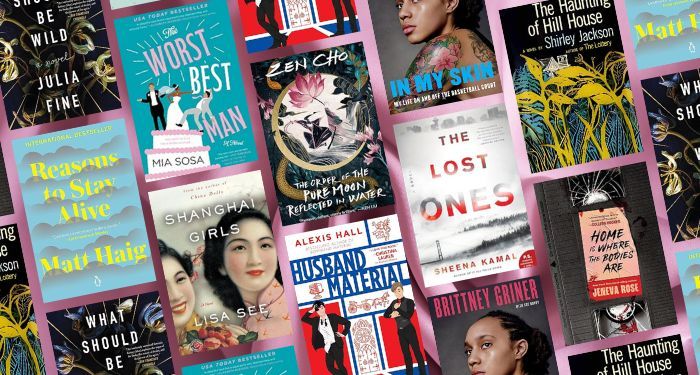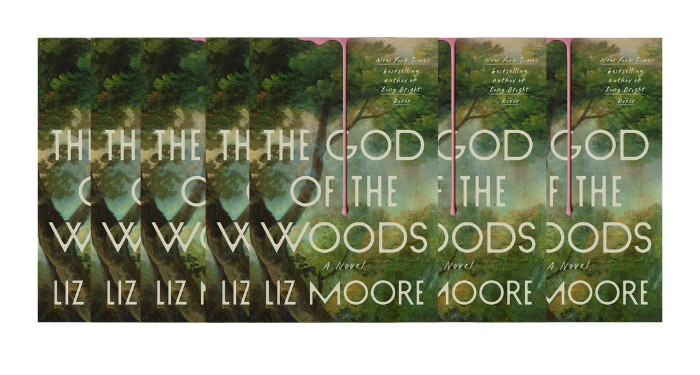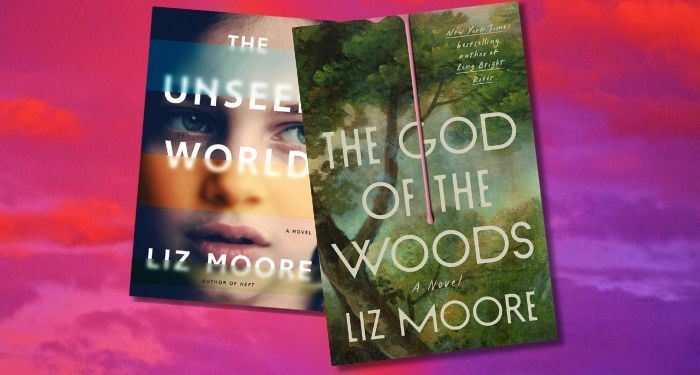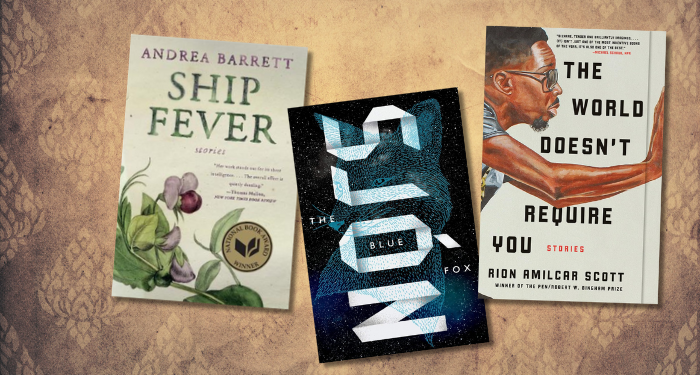What 100-Year-Old Grace Linn Can Teach Us About Standing Up for the Freedom to Read: Book Censorship News, March 31, 2023
Grace Linn is a 100-year-old widow of a WWII veteran, a grandmother, and a craftivist. On Tuesday, she spoke at a Martin County, Florida school board meeting to protest the removal of 80+ books from the school library. Her statement has gotten a lot of media coverage, and she was later interviewed on MSNBC, Fox 35, and more. That’s for good reason, because in a speech that lasted only a few minutes, she’s effectively demonstrated what’s needed to fight back against censorship.
Kelly Jensen is taking a much-needed break this week, so I’m filling in for the Censorship News Roundup. One of the questions Kelly and other anti-censorship activists and groups receive the most often is, “What can we do? How can I help?” The Censorship Round Up archive is filled with so many ways to help, from voting to calling your representative to speaking up in school board and library board meetings and more. We also have an anticensorship tool lit. We even compiled and updated resources into an ebook: How to Fight Book Bans and Censorship. The resources are there. But it’s up to you to act, and Grace Linn shows exactly how to do that. Here are some of the lessons she provides, from easiest to the more challenging!
1) Show Up To School Board and Library Board Meetings
The first step to making your voice heard is to show up — and if Grace Linn can do it at 100, hopefully she can be a role model to others. If you are nervous because of the kind of vitriol that comes out in some of these meetings, consider bringing a friend. If you absolutely cannot show up — because you have to work at the same time, for example — see if you can convince a friend or family member (or many!) to show up. And write in with your thoughts. Call if you can, because that usually leaves a bigger impression, but writing in or emailing is also a great step.
2) Speak Up
Attending these meetings is the first step, but in order to make your voice heard, you do have to speak up! Each board will have its own standards for signing up to speak and for how long you can speak. Usually, you’ll have just a few minutes. Most people script their statements, and you can practice beforehand to make it more comfortable. Grace Linn’s statement is short and powerful — though you don’t have to live up to it to speak! Here’s a template to get you started.
3) Use Your Passions
One of the reasons Grace Linn’s statement went viral is that she made a quilt with banned and challenged books. Quilting is a beautiful and time-consuming art form, so holding up this quilt communicates without saying a word just how passionate she is about this topic. It’s craftivism! Think about what you’re passionate about, what your hobbies are, and how you can use them to fight for the freedom to read. Maybe it’s hosting a frisbee golf fundraiser to raise money for EveryLibrary. Maybe it’s making TikToks or graphics to spread the word. Maybe it’s having a public read-in with your book club outside the school district’s building. Whatever it is that you already love doing, brainstorm how you can use it to make literary activism something that’s personally engaging as well as meaningful.
4) Have it Filmed and Spread the Word
Of course, Grace Linn’s speech never could have gone viral if it wasn’t filmed. These board meeting comments may be filmed already, but it doesn’t hurt to get a friend to do this, too, especially if they have a high-quality camera. Bonus points if you can get someone to edit it and some professionalism. Then it’s time to spread the word: post it on social media, ask your followers to boost it, and see if you can get it to someone with a larger following who can get more eyes on it. Be sure to make a TikTok/Instagram Reels-friendly version, too.
5) Tell a Story and Evoke Emotion
Here’s where it gets a little more advanced. One of the reasons Grace Linn’s statement is so powerful is that it is personal and tells a story. Grace talks about her late husband fighting in World War II, evoking Nazi book bans and explaining that he fought for freedom, including the First Amendment and the freedom to read.
“One of the freedoms that the Nazis crushed was the freedom to read the books they banned. They stopped the free press and banned and burned books. The freedom to read, which is protected by the First Amendment, is our essential right and duty of our democracy. Even so, it is continually under attack by both the public and private groups who think they hold the truth.
Banning books and burning books are the same. Both are done for the same reason — fear of knowledge. Fear is not freedom. Fear is not liberty. Fear is control. My husband died as a father of freedom. I am a mother of liberty.
Banned books need to be proudly displayed and protected from school boards like this.”
(Bonus points for reclaiming the title Mother of Liberty. Incredible stuff.)
We haven’t all lived 100 years to draw on, but there’s a reason you’re passionate about this topic. Some people talk about how books have been life-saving in their own life. Others talk about loved ones who are affected by book bans.
Book banning groups tap into people’s fear and anger to go viral. Evoking emotion is a powerful tool, but there are so many better ways to do that. A personal story about the joy and acceptance you found in reading a book that represented you is also emotional, but in a more positive war.
6) Bring a Visual
One of the strategies Moms for Liberty and other similar group use is taking quotes or comics panels out of context, blowing them up, and putting them on poster board with a lot of fear-mongering additions. Grace Linn’s quilt is not only a way to bring in her crafting skills and passion, but it’s also eye-catching and incredibly memorable. Of course, most of us don’t have that exact skill, but think about a visual you can bring along when you speak. Maybe it’s quotes from readers who found that book life-saving, or the logos of all the awards it’s received. Maybe, if you’re a student, it’s a photo of you and your friends having a book club and all happily holding up the book. Or maybe you have your own craft to bring, like a book banning version of a temperature blanket!
I hope that this inspires you to follow in Grace Linn’s footsteps!
If you are a literary agent, don’t forget to fill out Kelly’s survey about whether you’ve seen book banning have an effect on book acquisitions. And if you aren’t a literary agent, please boost it on social media to get it to the right people!
Book Censorship News: March 31, 2023
- Missouri lawmakers have voted to defund their libraries, cutting all $4.5 million in state funding. Republican Representative Cody Smith said the funding cut was because of the lawsuit American Civil Liberties Union of Missouri filed fighting book banning legislation. Smith said, “I don’t think we should subsidize that effort, so we’re going to take out the funding.” A representative of the ACLU said, “If the members of the committee are concerned about preserving taxpayer funds, they should stop enacting laws they know do not meet constitutional muster, not burden local governments in a misguided effort to silence organizations who object to the legislature’s overreach.”
- Indy Reads, a literary nonprofit in Indianapolis, received a bomb threat for hosting a drag story hour.
- A Heyworth Junior High School (IL) teacher was fired — sorry, “involuntarily resigned” — because she had a copy of This Book is Gay by Juno Dawson in her classroom. This was not part of the curriculum. It was just one of the books in the classroom library.
- Louisiana Representative Clay Higgins wants to replace public libraries with church-owned libraries. He tweeted, “The libraries regular Americans recall are gone. They’ve become liberal grooming centers.”
- 100 Indiana elementary students held a walk-out to protest Indiana’s “Don’t Say Gay” bill. Third grader Scarlet Chavez said, “We are trying to protest to make sure that kids have rights and won’t be stopped from expressing their whole self.” (Those photos are simultaneously adorable and heartbreaking.)
- Jodi Picoult has been speaking about her books being banned, including on ABC News. She mentions that the strategy being used is to challenge huge amounts of books at a time, which means that the books will immediately be pulled and be held up in a very slow review process. That way, even if a book is eventually approved, it will have been kept off shelves for months — and may just be challenged again, starting the cycle over.
- Central York High School (PA) has removed Push by Sapphire for review. A student spoke out at the school board meeting, saying how important it is for her to see books with main characters that look like her, and said, “Why can’t we have our own mind — our own voice?” Dozens of students showed up to the meeting wearing red to protest the ban. Bizarrely, Superintendent Peter Aiken said during the meeting, “There’s no playbook for this.” Every school library should have a playbook for this — a set of guidelines on how to handle book challenges. After Central York has been in the news countless times for book bans in the last few years, it’s ridiculous to not have a policy hammered out.
- Galesburg-Augusta High School (MI) librarian Jerod Kauffman has spoken out about book challenge policies not being followed by the principal and district superintendent. Challenged books are supposed to stay on the shelves until the review is completed, according to policy. Superintendent Wendy Maynard-Somers said the book wasn’t removed from shelves; they just checked it out to review it…which accomplishes exactly the same thing.
- “The Spring Branch ISD [TX] School Board voted to allow the Board of Trustees to decide if books should be banned, without input from teachers and librarians.” The superintendent has said it’s temporary, because they have received such a huge amount of book challenges: “I’m not going to call my entire academic staff off to sit and listen to book challenges every day, all day while our kids don’t get what they need. So I’m asking for the board to assist me.” It claims that the district spent $30,000 and 226 staff hours on a single book challenge. Book reviews should take time and be carried out by professionals. This only rewards book banners for challenging a long list of titles at a time.
- A proposed Iowa bill would have any book that has been banned from one school removed from every school in the state.
- The Iowa Association of School Boards has said that if the Iowa bill passes, staff would have to read thousands of books at each school to ensure that no high school library books include “depictions of sex acts.”
- Tam Kelley tried to get You Know, Sex banned from Conway Public Library (AR), but instead she’s been banned, for taking the book from the children’s section without checking it out. (You know, stealing.)
- Fear-mongering about Gender Queer has spread to Australia.
- The Virgin Suicides has been pulled from the curriculum of an optional English class as North Smithfield High School (RI).
- The Disney movie Ruby Bridges has been pulled from North Shore Elementary school (FL) until it is reviewed, after a parent claimed it “might result in students learning white people hate Black people.”
- Hilton Central School District (NY) received ANOTHER bomb threat over LGBTQ+ books. Specifically, the bomb threat mentioned This Book Is Gay. That’s twice in one week the schools have been on lock out for bomb threats.
- This Book Is Gay has been banned at Hillsborough County (FL) middle schools.
- Alice Oseman spoke out after Heartstopper was removed from Clay County District Schools (FL).
- St. Tammany Library Control Board (LA) voted to keep all five books challenged, including I am Jazz and The Bluest Eye. When MJ Castillo spoke out about her experiences being bullied as an LGBTQ+ young person, someone with the book banning group the “Accountability Project” heckled her about the Nashville school shooter being transgender.
- After “Rainbowland” by Miley Cyrus and Dolly Parton was banned from a Wisconsin elementary school, Miley Cyrus donated to Pride and Less Prejudice, which provides “free LGBTQ age-appropriate books to classrooms from preschool to third grade.”
- Missouri library workers are getting threatened with jail time for doing their jobs, and police are already showing up to investigate claims of them distributing pornography to minors. This article also shows how this fear has led to librarians self-censoring.
- Florida House Bill 1069, aka the “period ban” bill, would prevent discussion of menstruation, including between kids, for students younger than sixth grade. Here’s what five Florida teens think about the bill.
- A McKinney ISD school board member spoke in front of the Texas House Committee on Public Education in support of more restrictions around the books allowed in school libraries. He called The Bluest Eye by Toni Morrison “a very disgusting book” and claims children are going to school in furry costumes.
- In response to Republicans advocating for book bans instead of gun regulation, Florida Democrat Jared Moskowitz said, “Dead kids can’t read.”
Also In This Story Stream
-
Are Literary Agents Seeing Changes in Publishing with Increased Book Bans (A Survey): Book Censorship News, March 24, 2023 -
I Asked ChatGPT Why Books Should Be Banned: Book Censorship News, March 17, 2023 -
Anti-Censorship Groups Across the US: Book Censorship News, March 10, 2023 -
Giving Up Is Not an Option: Book Censorship News, March 3, 2023 -
More Politicians Need To Address Book Bans: Book Censorship News, February 24, 2023 -
How to Talk About Book Bans With Friends, Library Patrons, and More: Book Censorship News, February 17, 2023






